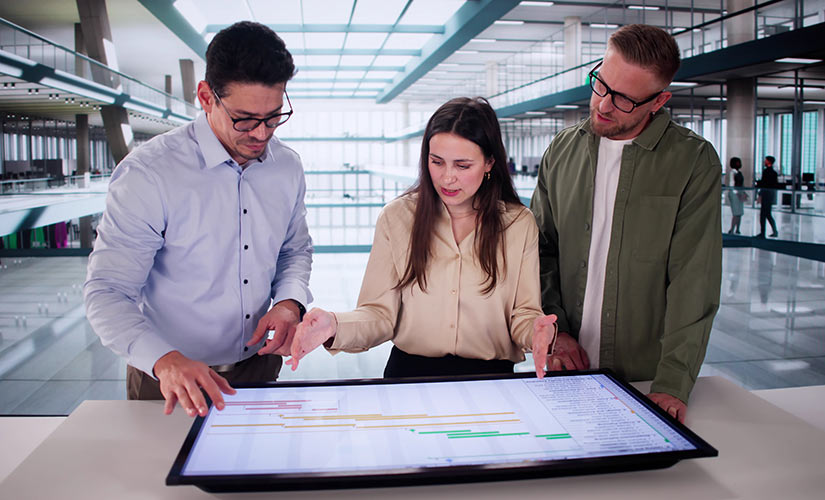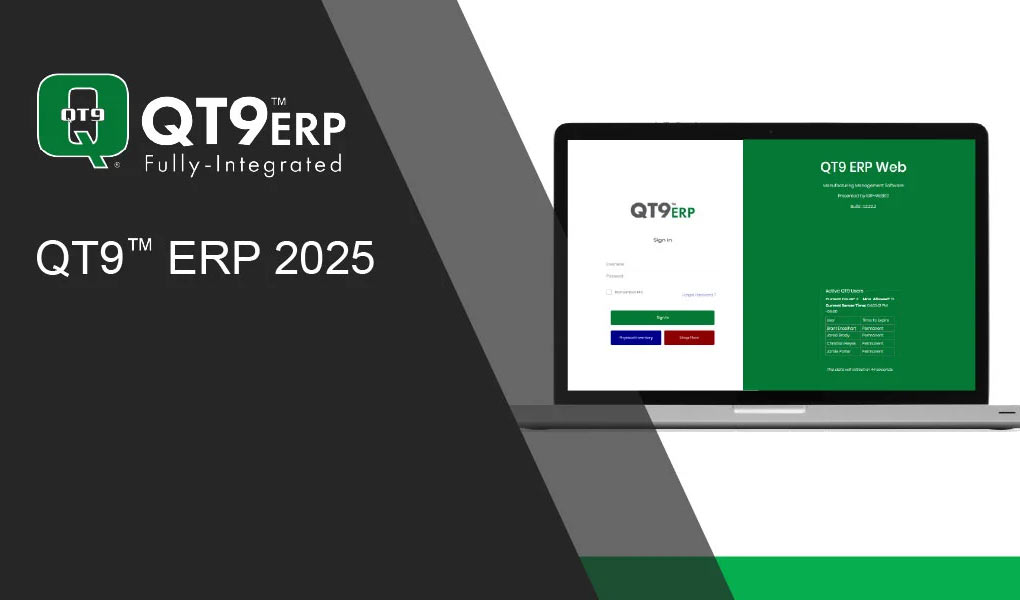Take Control of Your Bill of Materials
QT9 ERP’s Bill of Materials Module simplifies how you build, manage and revise BOMs so you can minimize errors, reduce costs and accelerate production.
Centralize Your BOMs
Manage all product structures in one place.
Speed Up Production
Create work orders with pre-set material and labor requirements.
Reduce Manual Errors
Automate BOM processes to prevent miscommunications.
Track Revisions Easily
Maintain full revision history with built-in approval and audit trails.
Improve Cost Accuracy
Tie material, labor, and overhead costs directly to your BOMs.
Simplify Compliance
Support ISO, FDA and GMP standards.
What is bill of materials software?
Bill of materials (BOM) software is a tool used by manufacturers to define, organize and manage the components and processes needed to produce a finished product. A BOM lists all parts, materials, sub-assemblies and labor requirements, ensuring that production runs efficiently and accurately. BOM management is essential for meeting quality standards like ISO 9001 and GMP, as it enables full traceability, cost tracking and version control across a product’s lifecycle.
QT9 ERP's BOM software helps manufacturers centralize and automate how BOMs are created, revised and maintained. Whether managing simple or multi-level assemblies, QT9 gives you real-time visibility into material usage, costs and changes. Fully integrated within the QT9 ERP system, it connects seamlessly with inventory, work orders and purchasing—supporting compliance with industry regulations and simplifying audit preparation.
Powerful bill of materials software. Seamless control.
Discover the core features manufacturers rely on to manage complex assemblies, track changes and stay audit-ready.
Multi-Level BOMs
Build complex assemblies with nested components and sub-assemblies.
Version Control
Track BOM revisions with approval workflows and change history.
Work Order Sync
Auto-generate work orders directly from approved BOMs.
Cost Tracking
View real-time material, labor and overhead costs per BOM.
Material Linking
Link raw materials, parts and finished goods across systems.
Inventory Check
Compare BOM needs with available inventory before production.
Role Permissions
Control who can view, edit or approve BOMs at each stage.
Audit Ready
Store all changes and approvals with timestamped history for audit readiness.
Centralize data with 17+ modules included
FAQ: Bill of materials software
A Bill of Materials is a comprehensive list of all the raw materials, components, assemblies and subassemblies, along with instructions, that go into the manufacture, assembly or repair of a product.
Using a hierarchical structure, a BOM provides detailed information about every part and step required to create the final product, with the finished product at the top and the individual components and raw materials populating the bottom levels.
Key elements of a BOM include:
- Part identifiers, such as a name or number
- Descriptions – brief explanations of a part or assembly that reinforce identification, such as size
- Quantities
- Unit of measure
- BOM level – usually a unique number indicating where each part or assembly fits in relation to other assemblies and the final product
- Routing – indicates at which point in the manufacturing process the material is needed
- Procurement type - indicates whether a component is to be purchased, produced internally or manufactured by a third party
The most common types of BOMs include:
Engineering Bill of Materials (EBOM)
EBOMs are created during the product design phase and include detailed engineering specifications for parts, components and subassemblies, technical drawings and instructions developed by product engineers.
Manufacturing Bill of Materials (MBOM)
MBOMs focus on product production, identifying all of the parts and assemblies for a particular product and specifying how materials are to be assembled. These BOMs cover every aspect of production necessary to build and ship a product, including packaging.
An MBOM is also important in that it identifies what parts are needed at each stage of production, helping manufacturers better manage the purchase and delivery dates of raw materials, and ultimately the final product.
Service Bill of Materials
A service BOM is often created during a product’s engineering phase. It lists the replaceable parts and instructions for product maintenance. It is used for servicing and repairing products.
Single-Level BOM and Multilevel BOM
BOMs can be structured as single-level or multilevel, depending on the complexity of the product and the manufacturing process.
A single-level BOM provides a straightforward list of components needed to create a product. It does not account for subassemblies or hierarchical relationships between components. It is best for simple products with few components.
A multilevel BOM includes all components and their hierarchical relationships, detailing subassemblies and how they contribute to the final product. Each subassembly has its own BOM nested within the main BOM. Multilevel BOMs are used for complex products with multiple assemblies, such as a vehicle.
Bill of Materials software automates the creation and use of BOMs, decreasing errors and making it easier to initiate changes and reworks. BOM software avoids manual processes associated with spreadsheets, helping to prevent inconsistencies, duplications and omissions that may result in production delays and wasted resources.
Bill of Materials software not only creates major efficiencies in design and production processes, it also enables greater accuracy and control. With it, manufacturers can automate data entry and document updates, which can then automatically populate across the system.
BOM software centralizes all BOM information, promoting better collaboration and ensuring team members are working with the latest and most accurate information. Businesses get automatic full traceability for easier regulatory compliance. As operations grow, BOM software can handle increasing complexity, including multilevel BOMs able to identify and track thousands of components.
Explore our latest ERP articles

QT9 Software Announces Nuvei Integrated Software (ISV) Partner Status

How ERP Software Improves Business Efficiency

QT9 ERP 2025 Launches with Powerful New Upgrades
Try QT9 for free
Ready to unify your business processes? No credit card needed.